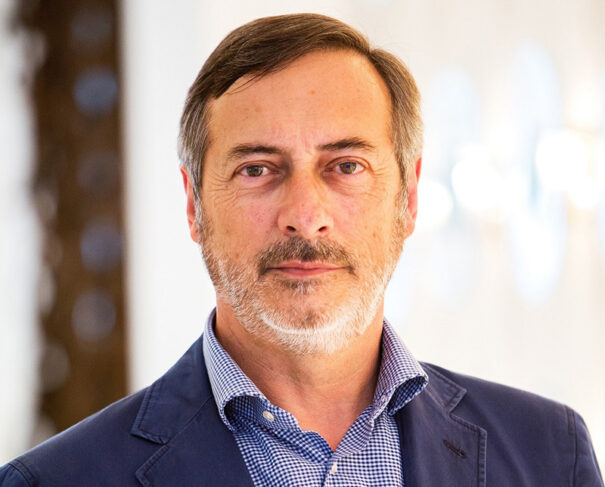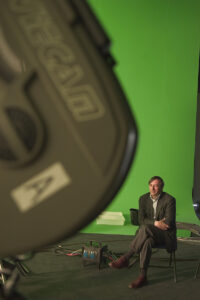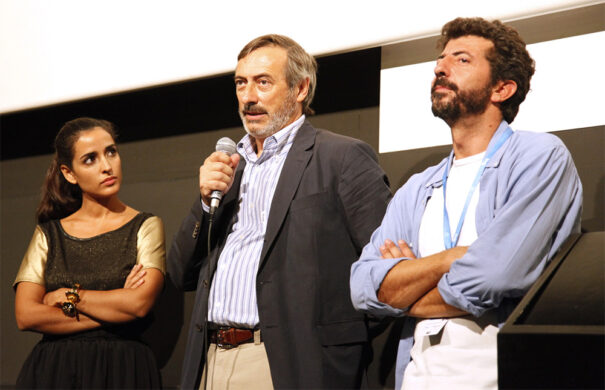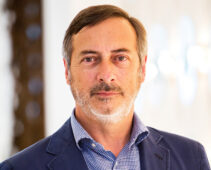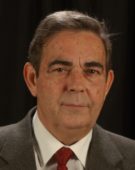José Antonio Félez: “Cinema has to attend to its renewal”
A punto de recibir la Medalla de Oro en la edición 2021 de los Forqué Awards, José Antonio Félez, productor de películas como La Isla Mínima, El Bola o La Gran Familia Española, analiza el paso del tiempo en el cine y aporta su visión sobre el estado actual de la industria.
Ya sea a título póstumo o en los últimos compases de una vida dedicada al séptimo arte, los reconocimientos en el mundo del cine llegan demasiado tarde. Por eso, casos como el de José Antonio Félez son rara avis, hasta el punto que el productor se llega a cuestionar, entre risas, su propio estado de salud.
La realidad es que al productor se encuentra “razonablemente bien de salud” y no tiene previsto dejar esta industria, que aún a día de hoy, en plena vorágine de proyectos impulsados por las grandes plataformas mediáticas, define como “incierta”. Al igual que era diez años atrás, en plena crisis económica; o tal y como sucedía hace dos décadas, cuando desde Tesela PC dio voz a creadores emergentes como Achero Mañas para que crearan obras tan eternas como el Goya a la mejor película que logró El Bola (2000).
A pesar de la incertidumbre, Félez ha logrado dar los recursos necesarios a voces que tenían historias que narrar a la historia española. Ya fuera desde la propia Tesela PC o con Atypical Films, que fundaría en 2009 junto a Cristina Sutherland, ha estado estrechamente ligado a las carreras de cineastas como Alberto Rodriguez (El factor pilgrim (2000), El traje (2002), 7 Vírgenes (2005)…), Daniel Sánchez Arévalo (BlueDarkAlmostBlack (2006), Gordos (2009), Cousins (2011)…) o Santi Amodeo (Astronautas (2003); Cabeza de perro (2006). Por no hablar del talento, al margen de la dirección, que ha ido creciendo hasta obtener posiciones destacadas en el mundo cinematográfico, como el director de fotografía Álex Catalán (The minimal island (2014), The man of a thousand faces (2016)…), o el guionista Rafael Cobos (Group 7 (2012), La Isla mínima (2014)…)
En esta entrevista, Félez aborda su Medalla de Oro en los Forqué, pero también reflexiona sobre el paso del tiempo, the realidad del ecosistema del cine español and the grandes necesidades de la industria para 2021 y los años venideros.
 Medalla de Oro en los Forqué 2021
Medalla de Oro en los Forqué 2021
¿Cómo le hace sentir un reconocimiento por parte de la industria como la Medalla de Oro de los Premio Forqué?
Con grandísima ilusión, ya que es un premio que conceden, de alguna forma, tus compañeros de profesión. Eso le da un valor y un significado especial. Por eso, lo recibo con gran gratitud y mucha ilusión.
En la propia Gala habrá tiempo para los agradecimientos, pero… ¿cuáles considera que han sido sus pilares imprescindibles en su trayectoria profesional?
Efectivamente, los agradecimientos de la gala de los Forqué tendrán que ser necesariamente largos, ya que hay mucha gente a la dar las gracias. Hay algunos nombres que son más conocidos y otros que menos. De entre directores y guionistas, podría dar nombrar a Achero Mañas, Alberto Rodríguez, Daniel Sánchez-Arévalo… Después, desde la perspectiva de la producción, podría nombrar a Daniel Goldstein, que lamentablemente ya no está aquí; Carlos De Muns, Francisco Lázaro… Todos ellos fueron personas que estuvieron a mi lado y contribuyeron a que la cosa saliera bien. Después, también habría que dar las gracias a muchísimas personas del equipo de producción, directores de fotografía, músicos como Julio de la Rosa… ¡Sinceramente, es una lista muy larga y espero no dejarme a nadie! Y, por supuesto, también Cristina Sutherland, cofundadora de Atípica; o Iván Benjumea-Rey, que lleva conmigo muchísimos años. Aun así, dejo a muchísima gente fuera.
El mundo del cine es así…
¡Es que hablamos de muchísima gente! Realmente, creo que el audiovisual, el cine, es un trabajo de equipo. Tanto éxitos como fracasos se hacen a base de muchas manos y muchas cabezas. De eso, uno nunca se puede olvidar por muy bueno que sea. Al final, siempre necesitas de otro para poder llevar a cabo estos proyectos.
Los reconocimientos suelen llegar al final de las trayectorias. Pero este no es el caso, ¿verdad?
¡Me hice la misma pregunta! Cuando me comunicaron la noticia al principio sentí una gran ilusión. Sin embargo, después me quede pensando. ¿Es que ya me ven de salida? Después, ya te enteras de que a RTVE se lo dieron hace unos años y te quedas más tranquilo. Pero no, disfruto muchísimo trabajando, tengo ganas de seguir haciendo cosas y me encuentro razonablemente bien de salud.
Impulsando talento emergente
Aún sabiendo que todavía quedan historias por contar, ¿de qué forma definiría su metodología de producción, esa filosofía que, al fin y al cabo, ha llevado a la industria a reconocer una trayectoria?
Diría que hacer las cosas con rigor y con criterio. Eso es lo que he intentado siempre. Lo aprendí de Elías Querejeta: independientemente del tamaño del proyecto, hay que hacer las cosas bien. Siempre he procurado realizar los proyectos con prudencia, seguir unas pautas, repetir con las mismas personas si estas también lo querían, y fijar unos objetivos y mantenerlos: se pueden corregir con el paso del tiempo, pero no se deben dar bandazos.
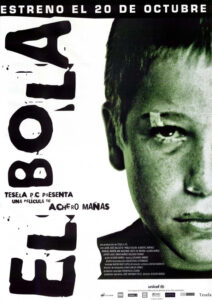 Durante las últimas semanas, se ha dicho que gran parte de su labor ha pasado por dar a conocer y apoyar talento emergente. ¿Este ha sido una de las metas principales de su trabajo?
Durante las últimas semanas, se ha dicho que gran parte de su labor ha pasado por dar a conocer y apoyar talento emergente. ¿Este ha sido una de las metas principales de su trabajo?
Fundamos Tesela con esa aproximación: empezar a trabajar con talento nuevo, con directores sin experiencia en largometrajes, y hacer carrera con ellos. Ese era nuestro objetivo. Así lo hice con Achero, Albero Rodríguez, Santi Amodeo, Daniel Sánchez-Arévalo y tantos otros. Evidentemente, con el paso de los años, hemos seguido trabajando con unos y, con otros, se ha separado nuestros caminos.
¿Por qué elegir esa aproximación hacia los nuevos creadores?
Me gustaba creer que había historias nuevas. Como los directores noveles tenían complicado acceder a unas condiciones de producción suficientemente buenas, nuestro objetivo era proporcionarles esos medios para que sus óperas primas tuvieran todo lo que tenían que tener. Después, si quedábamos ambas partes satisfechas, podíamos seguir adelante y hacer una segunda o tercera película. ¡Y ha habido suerte, porque con algunos de ellos llevamos ya una larga trayectoria! También hay que tener en cuenta que este recorrido hecho con directores también se ha llevado a cabo con equipo técnico; gente que ahora son referencia en distintos departamentos empezaron conmigo. Álex Catalán, en fotografía; Manuela Ocón, a la dirección de producción; Fernando García, al vestuario… Es algo de lo que me siento muy orgulloso.
El cine: la eterna incertidumbre
Hace diez años, definía la industria cinematográfica con el término “incertidumbre”
Creo que eso no ha variado…
¿Cómo ve la industria a día de hoy? ¿La incertidumbre permanece?
La veo igual. Todo es incierto. Es verdad que no vivimos una crisis financiera como hace diez años y que hay una grandísima actividad. De hecho, a nivel de series, los grandes operadores encargan grandes proyectos, pero también es una situación incierta. ¿Por qué? ¡Porque todo cambia muy deprisa! Al variar todo tan rápido, no solo la técnica, sino también la forma de consumo, gustos, hábitos, distribución, relaciones entre los distintos agentes del audiovisual… Existe una gran efervescencia, pero hay que procurar que la industria y la producción se pueda mantener en el tiempo. Además, un aspecto muy importante es la necesidad de atender a la renovación. Hay que procurar que se sigan haciendo películas, y que las que se hagan sean plurales y variadas, que es algo que creo que se ha perdido. Hace diez años se hacían películas con planteamientos mucho más diversos, de distintos tamaños y con objetivos y temáticas muy diferentes. Mi sensación es que ahora mismo eso se ha perdido. Antes contábamos con verdaderas joyas. Ahora, creo que eso está en riesgo.
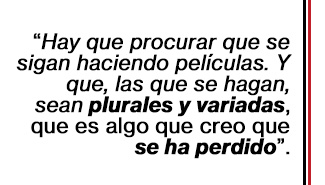 Durante 2021 se han estrenado cintas como Destello Bravío, Espíritu Sagrado o incluso El vientre del mar con enfoques innovadores a pesar del bajo coste de sus propuestas. Sin embargo, es cierto que apenas han tenido recorrido o reconocimiento por parte de los académicos, como muestran las nominaciones de los Goya…
Durante 2021 se han estrenado cintas como Destello Bravío, Espíritu Sagrado o incluso El vientre del mar con enfoques innovadores a pesar del bajo coste de sus propuestas. Sin embargo, es cierto que apenas han tenido recorrido o reconocimiento por parte de los académicos, como muestran las nominaciones de los Goya…
¡A eso me refiero! Has elegido muy bien los ejemplos. Diría que antes era mucho más fácil conseguir una cierta visibilidad y distribución para esos productos. Ahora es mucho más difícil, con lo cual ahí hay un problema. El cambio en la industria se producía por la renovación. Había gente nueva que llegaba y tenía propuestas y visiones diferentes. Además, podías hacerlo con equipo que estaba empezando. Para este sector es muy importante que llegue sangre nueva. El cine no deja de ser un oficio. No nos podemos olvidar de eso. Es muy importante el tiempo y la experiencia para conseguir niveles de profesionalidad elevados. Los profesionales deben llegar desde abajo, aprendiendo de otros que han pasado por su sitio antes para que se produzca esa renovación. Creo que ahora las cosas son diferentes.
¿Considera que desde la industria se puso el foco en proyectos de primer nivel apoyados en grandes grupos mediáticos y eso ha hecho que se pudiera dejar de lado el apoyo a creadores noveles?
Sinceramente, quien se encarga de la producción tiene unos objetivos que siempre serán perfectamente lícitos. Si necesito muebles de cocina, no encargo muebles de baño. Lo que yo defiendo es que tienen que haber espacios para que, a través de distintos mecanismos, se puedan hacer productos con planteamientos diferentes. Creo que los dos mundos pueden convivir. Durante los últimos años, en parte por la globalización que sucede en todos los ámbitos, se han creado grandes compañías en el sector audiovisual. Evidentemente, estos agentes harán lo que consideren para lograr sus objetivos. Aún con todo, lo necesario es que el ecosistema conviva; que convivan estos grandes actores e impulsores del mercado, y que por otra parte existan compañías pequeñas que puedan hacer productos más artesanales o diferentes. Y, por supuesto, esos productos tendrán que tener su determinada difusión y visibilidad. ¡Eso es lo importante! Hay público para ello.
El mañana
Se aproxima un cambio determinante para la industria audiovisual: la nueva Ley del Audiovisual. En su opinión, ¿qué puntos críticos deberían afrontarse con mayor urgencia para ayudar a compañías como Atípica a superar sus retos presentes y futuros?
Es una cuestión muy compleja. Aun así, destacaría que la norma debería ser equilibrada. Eso es lo que se tiene que conseguir. El ecosistema audiovisual es muy delicado y cualquier actuación exagerada puede producir desequilibrios. Y esos desequilibrios no son deseables.
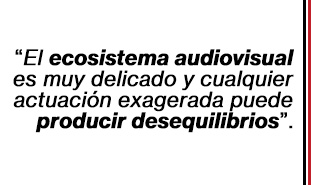 Abordando brevemente la técnica, ¿desde Atípica ya han comenzado a impulsar proyectos usando técnicas de producción virtualizada? ¿Cuál es su opinión sobre este tipo de soluciones tanto como productor como espectador?
Abordando brevemente la técnica, ¿desde Atípica ya han comenzado a impulsar proyectos usando técnicas de producción virtualizada? ¿Cuál es su opinión sobre este tipo de soluciones tanto como productor como espectador?
Desde Atípica, ya estamos utilizando todo este tipo de recursos. Lo que antes se rodaba con telas verdes o azules ahora se hacen con LED. Nosotros usamos esta técnica simplemente para hacer secuencias de automóviles, ya que el sistema permite que puedas poner la cámara en cualquier posición. Lo cierto es que no hemos ido más allá de esta aplicación. Sin embargo, es cierto que esta tecnología, para hacer películas de un determinado género como ciencia ficción o futurista, da unas posibilidades impresionantes. Creo que cada vez irá teniendo más importancia. Pero creo, sinceramente, que no sirve para todo tipo de películas. Tener localizaciones físicas con sus imperfecciones y materialidad dan a la producción un carácter muy importante.
Atípica trabaja en varios proyectos, como la película Model 77 de Alberto Rodríguez o series como Those in the last row o La chica de nieve para Netflix. ¿Hacia dónde se dirigen sus iniciativas futuras? ¿Seguirá trabajando de la mano de grandes plataformas?
Más allá de Model 77, de la que estamos en fase de postproducción, hemos realizado series con diferentes plataformas como Movistar o Netflix. Por ahora, tenemos pensado seguir combinando los dos tipos de producción: aquellas en las que la iniciativa parte de Atípica, y luego otros encargos propuestos por las diferentes plataformas.
An interview by Sergio Julián Gómez
Did you like this article?
Subscribe to our NEWSLETTER and you won't miss anything.



